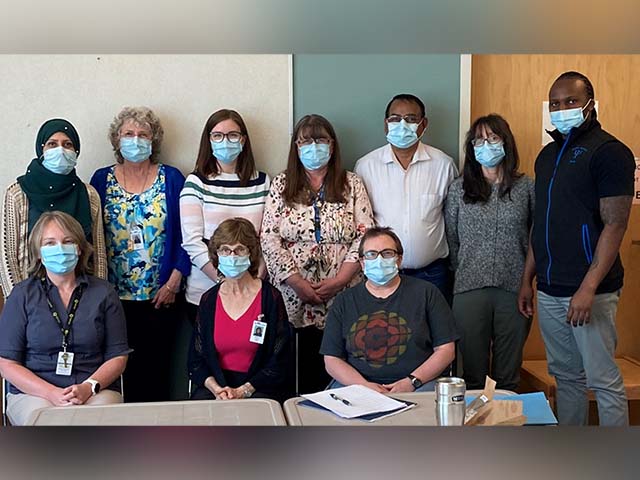Dr. Faiza Jabbar has worked as a psychiatrist at the University Hospital of Northern BC (UHNBC) in Prince George for almost ten years. Before coming to Canada, she worked in Ireland for over ten years, where she first completed her residency and specialization in general adult, geriatric, and forensic psychiatry, and then worked as an attending psychiatrist.
Since moving to Prince George, she has worked to improve the delivery of mental health care by following evidence-based treatments. For the last two years, she’s been pioneering a project to improve the delivery of group therapy programs on the acute psychiatric ward at UHNBC, which is known as “3 North East” or “3 NE.”
There’s a widely held belief that psychiatrists only prescribe medications, but Dr. Jabbar is actively challenging that idea through innovation in psychiatry using research from the fields of psychotherapy and biopsychosocial science. She believes that holistic health is the most important contributor to a healthy lifestyle – that is, mind and body working together.
While she acknowledges that medication is important, she believes it’s only one part of achieving mental health. In Dr. Jabbar’s opinion, for most psychiatric cases, “only one-third of the solution is meds.”
For her physician quality improvement (PQI) project, Dr. Jabbar chose to modify and improve the existing group psychotherapy program on 3 NE for UHNBC’s psychiatry department. She knew that if this wasn’t done, the program might remain unchanged for years: physicians and staff are busy, the wards are often understaffed, and the COVID-19 pandemic has made all of this worse.
It would have been easy to continue the status quo; however, Dr. Jabbar knew that for the long-term recovery of patients and the success of the medical team, changes were needed.
For example, she added Cognitive Behavioural Therapy (CBT) to the updated group programming. CBT is an effective short-term form of psychotherapy that can help patients develop skills and strategies to recover from depression and anxiety.
With CBT, patients can learn about their thoughts, attitudes, and beliefs, and as a result, they can improve difficulties in their lives. CBT also gives patients a sense of empowerment as they take control of their own wellness. All national and international guidelines recommend CBT as a first-line treatment for depression, anxiety, addiction, and many other common mental health issues.
Many factors, including CBT, improving coping skills, exercise, healthy eating, and improved physical health can all work together along with medications such as antidepressants to create successful treatment and a sense of wellness.
Dr. Jabbar's project included the creation of a written curriculum for the group psychotherapy program, which included a manual. The revised program includes a weekly schedule outlining the different daily therapy groups for inpatients on 3 NE, which include CBT, crisis coping skills (such as dialectical behavior therapy), stress management, wellness, art therapy, addiction support, and relaxation skills. Dr. Jabbar and the team also provided resource materials for patients and staff use both in group sessions, and outside of them.
Along with these regular therapy groups, Dr. Jabbar and her team also added fun leisure-time activities to the list of inpatient sessions, including karaoke, bingo, board and card games, coffee groups, and therapeutic LEGO®-building sessions. All these were very well received by patients.
As well, Dr. Jabbar and her team created patient information leaflets for 3 NE, featuring QR codes that readers can scan to access more information. Through PQI funding and Northern Health support, Dr. Jabbar also hopes to be able to install TV monitors displaying details of weekly group schedules and activities. She hopes that as well as providing information, the monitors will encourage patients to attend these groups.
Dr. Jabbar hopes that her efforts will streamline the psychiatry program at UHNBC, and that the changes will benefit patients not only in the short term during their inpatient stays, but also in the longer term. She hopes the program will give them the chance to experience new research-based therapies in the safe and welcoming environment of the inpatient ward, and that this will inspire them to engage with further therapies and take the initiative for their own well-being after discharge to their local communities.
Dr. Jabbar’s ultimate vision is to share this program with other teams within Northern Health, and to work to implement it further to benefit and support people in the North and beyond.
Dr Jabbar credits PQI Coach Shelley Movold with being a key player in the completion of this project. “Shelley kept everything and everyone on track,” she says.

She also gives credit to her amazing team, especially to director Shane DeMeyer, manager Bareilly Sweet, psychologist Dr. Meredith Reynolds, team lead Martin Kimani, and clinicians Patricia Crawford, Louis Boiragi, Sandy Ramsay, Marlace Susut, and occupational therapist Charlene Oldham. She also wanted to recognize clinical nurse educator Damen DeLeenheer.
As well, she notes that Dr. Reynolds provided valuable support for the project by reviewing the literature and co-writing and reviewing manuscripts.
“Without [the] team there to support the efforts, this project would not have become a reality,” says Dr. Jabbar. She added that despite many obstacles, the whole team worked very hard to fulfill their vision.
To see completed and ongoing PQI projects across the North, visit the PQI project map.
Access the 3 NE Booklet today.














Comments
Anonymous says
If you are in crisis, please call 1-800-784-2433 to speak to someone. Take care!
Dr faiza Jabbar
Former patient
Please and thanks